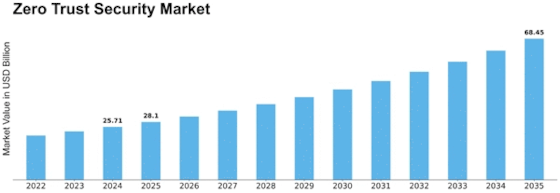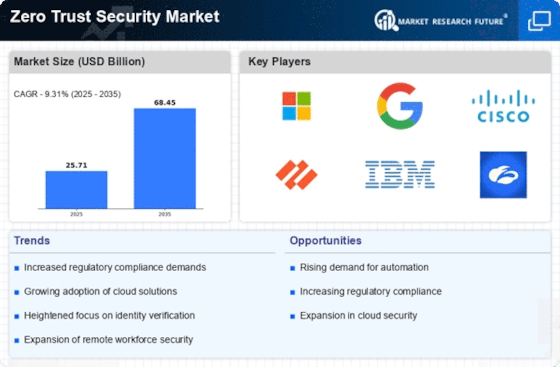Cloud-Based
On-Premises
Hybrid
Solutions
Services
Software
Identity Access Management
Network Security
Endpoint Security
Data Security
BFSI
IT and Telecommunications
Healthcare
Government
Retail
North America
Europe
South America
Asia Pacific
Middle East and Africa
North America Outlook (USD Billion, 2019-2035)
Zero Trust Security Market by Deployment Type
Cloud-Based
On-Premises
Hybrid
Zero Trust Security Market by Component Type
Solutions
Services
Software
Zero Trust Security Market by Application Type
Identity Access Management
Network Security
Endpoint Security
Data Security
Zero Trust Security Market by End Use Type
BFSI
IT and Telecommunications
Healthcare
Government
Retail
Zero Trust Security Market by Regional Type
US
Canada
US Outlook (USD Billion, 2019-2035)
Zero Trust Security Market by Deployment Type
Cloud-Based
On-Premises
Hybrid
Zero Trust Security Market by Component Type
Solutions
Services
Software
Zero Trust Security Market by Application Type
Identity Access Management
Network Security
Endpoint Security
Data Security
Zero Trust Security Market by End Use Type
BFSI
IT and Telecommunications
Healthcare
Government
Retail
CANADA Outlook (USD Billion, 2019-2035)
Zero Trust Security Market by Deployment Type
Cloud-Based
On-Premises
Hybrid
Zero Trust Security Market by Component Type
Solutions
Services
Software
Zero Trust Security Market by Application Type
Identity Access Management
Network Security
Endpoint Security
Data Security
Zero Trust Security Market by End Use Type
BFSI
IT and Telecommunications
Healthcare
Government
Retail
Europe Outlook (USD Billion, 2019-2035)
Zero Trust Security Market by Deployment Type
Cloud-Based
On-Premises
Hybrid
Zero Trust Security Market by Component Type
Solutions
Services
Software
Zero Trust Security Market by Application Type
Identity Access Management
Network Security
Endpoint Security
Data Security
Zero Trust Security Market by End Use Type
BFSI
IT and Telecommunications
Healthcare
Government
Retail
Zero Trust Security Market by Regional Type
Germany
UK
France
Russia
Italy
Spain
Rest of Europe
GERMANY Outlook (USD Billion, 2019-2035)
Zero Trust Security Market by Deployment Type
Cloud-Based
On-Premises
Hybrid
Zero Trust Security Market by Component Type
Solutions
Services
Software
Zero Trust Security Market by Application Type
Identity Access Management
Network Security
Endpoint Security
Data Security
Zero Trust Security Market by End Use Type
BFSI
IT and Telecommunications
Healthcare
Government
Retail
UK Outlook (USD Billion, 2019-2035)
Zero Trust Security Market by Deployment Type
Cloud-Based
On-Premises
Hybrid
Zero Trust Security Market by Component Type
Solutions
Services
Software
Zero Trust Security Market by Application Type
Identity Access Management
Network Security
Endpoint Security
Data Security
Zero Trust Security Market by End Use Type
BFSI
IT and Telecommunications
Healthcare
Government
Retail
FRANCE Outlook (USD Billion, 2019-2035)
Zero Trust Security Market by Deployment Type
Cloud-Based
On-Premises
Hybrid
Zero Trust Security Market by Component Type
Solutions
Services
Software
Zero Trust Security Market by Application Type
Identity Access Management
Network Security
Endpoint Security
Data Security
Zero Trust Security Market by End Use Type
BFSI
IT and Telecommunications
Healthcare
Government
Retail
RUSSIA Outlook (USD Billion, 2019-2035)
Zero Trust Security Market by Deployment Type
Cloud-Based
On-Premises
Hybrid
Zero Trust Security Market by Component Type
Solutions
Services
Software
Zero Trust Security Market by Application Type
Identity Access Management
Network Security
Endpoint Security
Data Security
Zero Trust Security Market by End Use Type
BFSI
IT and Telecommunications
Healthcare
Government
Retail
ITALY Outlook (USD Billion, 2019-2035)
Zero Trust Security Market by Deployment Type
Cloud-Based
On-Premises
Hybrid
Zero Trust Security Market by Component Type
Solutions
Services
Software
Zero Trust Security Market by Application Type
Identity Access Management
Network Security
Endpoint Security
Data Security
Zero Trust Security Market by End Use Type
BFSI
IT and Telecommunications
Healthcare
Government
Retail
SPAIN Outlook (USD Billion, 2019-2035)
Zero Trust Security Market by Deployment Type
Cloud-Based
On-Premises
Hybrid
Zero Trust Security Market by Component Type
Solutions
Services
Software
Zero Trust Security Market by Application Type
Identity Access Management
Network Security
Endpoint Security
Data Security
Zero Trust Security Market by End Use Type
BFSI
IT and Telecommunications
Healthcare
Government
Retail
REST OF EUROPE Outlook (USD Billion, 2019-2035)
Zero Trust Security Market by Deployment Type
Cloud-Based
On-Premises
Hybrid
Zero Trust Security Market by Component Type
Solutions
Services
Software
Zero Trust Security Market by Application Type
Identity Access Management
Network Security
Endpoint Security
Data Security
Zero Trust Security Market by End Use Type
BFSI
IT and Telecommunications
Healthcare
Government
Retail
APAC Outlook (USD Billion, 2019-2035)
Zero Trust Security Market by Deployment Type
Cloud-Based
On-Premises
Hybrid
Zero Trust Security Market by Component Type
Solutions
Services
Software
Zero Trust Security Market by Application Type
Identity Access Management
Network Security
Endpoint Security
Data Security
Zero Trust Security Market by End Use Type
BFSI
IT and Telecommunications
Healthcare
Government
Retail
Zero Trust Security Market by Regional Type
China
India
Japan
South Korea
Malaysia
Thailand
Indonesia
Rest of APAC
CHINA Outlook (USD Billion, 2019-2035)
Zero Trust Security Market by Deployment Type
Cloud-Based
On-Premises
Hybrid
Zero Trust Security Market by Component Type
Solutions
Services
Software
Zero Trust Security Market by Application Type
Identity Access Management
Network Security
Endpoint Security
Data Security
Zero Trust Security Market by End Use Type
BFSI
IT and Telecommunications
Healthcare
Government
Retail
INDIA Outlook (USD Billion, 2019-2035)
Zero Trust Security Market by Deployment Type
Cloud-Based
On-Premises
Hybrid
Zero Trust Security Market by Component Type
Solutions
Services
Software
Zero Trust Security Market by Application Type
Identity Access Management
Network Security
Endpoint Security
Data Security
Zero Trust Security Market by End Use Type
BFSI
IT and Telecommunications
Healthcare
Government
Retail
JAPAN Outlook (USD Billion, 2019-2035)
Zero Trust Security Market by Deployment Type
Cloud-Based
On-Premises
Hybrid
Zero Trust Security Market by Component Type
Solutions
Services
Software
Zero Trust Security Market by Application Type
Identity Access Management
Network Security
Endpoint Security
Data Security
Zero Trust Security Market by End Use Type
BFSI
IT and Telecommunications
Healthcare
Government
Retail
SOUTH KOREA Outlook (USD Billion, 2019-2035)
Zero Trust Security Market by Deployment Type
Cloud-Based
On-Premises
Hybrid
Zero Trust Security Market by Component Type
Solutions
Services
Software
Zero Trust Security Market by Application Type
Identity Access Management
Network Security
Endpoint Security
Data Security
Zero Trust Security Market by End Use Type
BFSI
IT and Telecommunications
Healthcare
Government
Retail
MALAYSIA Outlook (USD Billion, 2019-2035)
Zero Trust Security Market by Deployment Type
Cloud-Based
On-Premises
Hybrid
Zero Trust Security Market by Component Type
Solutions
Services
Software
Zero Trust Security Market by Application Type
Identity Access Management
Network Security
Endpoint Security
Data Security
Zero Trust Security Market by End Use Type
BFSI
IT and Telecommunications
Healthcare
Government
Retail
THAILAND Outlook (USD Billion, 2019-2035)
Zero Trust Security Market by Deployment Type
Cloud-Based
On-Premises
Hybrid
Zero Trust Security Market by Component Type
Solutions
Services
Software
Zero Trust Security Market by Application Type
Identity Access Management
Network Security
Endpoint Security
Data Security
Zero Trust Security Market by End Use Type
BFSI
IT and Telecommunications
Healthcare
Government
Retail
INDONESIA Outlook (USD Billion, 2019-2035)
Zero Trust Security Market by Deployment Type
Cloud-Based
On-Premises
Hybrid
Zero Trust Security Market by Component Type
Solutions
Services
Software
Zero Trust Security Market by Application Type
Identity Access Management
Network Security
Endpoint Security
Data Security
Zero Trust Security Market by End Use Type
BFSI
IT and Telecommunications
Healthcare
Government
Retail
REST OF APAC Outlook (USD Billion, 2019-2035)
Zero Trust Security Market by Deployment Type
Cloud-Based
On-Premises
Hybrid
Zero Trust Security Market by Component Type
Solutions
Services
Software
Zero Trust Security Market by Application Type
Identity Access Management
Network Security
Endpoint Security
Data Security
Zero Trust Security Market by End Use Type
BFSI
IT and Telecommunications
Healthcare
Government
Retail
South America Outlook (USD Billion, 2019-2035)
Zero Trust Security Market by Deployment Type
Cloud-Based
On-Premises
Hybrid
Zero Trust Security Market by Component Type
Solutions
Services
Software
Zero Trust Security Market by Application Type
Identity Access Management
Network Security
Endpoint Security
Data Security
Zero Trust Security Market by End Use Type
BFSI
IT and Telecommunications
Healthcare
Government
Retail
Zero Trust Security Market by Regional Type
Brazil
Mexico
Argentina
Rest of South America
BRAZIL Outlook (USD Billion, 2019-2035)
Zero Trust Security Market by Deployment Type
Cloud-Based
On-Premises
Hybrid
Zero Trust Security Market by Component Type
Solutions
Services
Software
Zero Trust Security Market by Application Type
Identity Access Management
Network Security
Endpoint Security
Data Security
Zero Trust Security Market by End Use Type
BFSI
IT and Telecommunications
Healthcare
Government
Retail
MEXICO Outlook (USD Billion, 2019-2035)
Zero Trust Security Market by Deployment Type
Cloud-Based
On-Premises
Hybrid
Zero Trust Security Market by Component Type
Solutions
Services
Software
Zero Trust Security Market by Application Type
Identity Access Management
Network Security
Endpoint Security
Data Security
Zero Trust Security Market by End Use Type
BFSI
IT and Telecommunications
Healthcare
Government
Retail
ARGENTINA Outlook (USD Billion, 2019-2035)
Zero Trust Security Market by Deployment Type
Cloud-Based
On-Premises
Hybrid
Zero Trust Security Market by Component Type
Solutions
Services
Software
Zero Trust Security Market by Application Type
Identity Access Management
Network Security
Endpoint Security
Data Security
Zero Trust Security Market by End Use Type
BFSI
IT and Telecommunications
Healthcare
Government
Retail
REST OF SOUTH AMERICA Outlook (USD Billion, 2019-2035)
Zero Trust Security Market by Deployment Type
Cloud-Based
On-Premises
Hybrid
Zero Trust Security Market by Component Type
Solutions
Services
Software
Zero Trust Security Market by Application Type
Identity Access Management
Network Security
Endpoint Security
Data Security
Zero Trust Security Market by End Use Type
BFSI
IT and Telecommunications
Healthcare
Government
Retail
MEA Outlook (USD Billion, 2019-2035)
Zero Trust Security Market by Deployment Type
Cloud-Based
On-Premises
Hybrid
Zero Trust Security Market by Component Type
Solutions
Services
Software
Zero Trust Security Market by Application Type
Identity Access Management
Network Security
Endpoint Security
Data Security
Zero Trust Security Market by End Use Type
BFSI
IT and Telecommunications
Healthcare
Government
Retail
Zero Trust Security Market by Regional Type
GCC Countries
South Africa
Rest of MEA
GCC COUNTRIES Outlook (USD Billion, 2019-2035)
Zero Trust Security Market by Deployment Type
Cloud-Based
On-Premises
Hybrid
Zero Trust Security Market by Component Type
Solutions
Services
Software
Zero Trust Security Market by Application Type
Identity Access Management
Network Security
Endpoint Security
Data Security
Zero Trust Security Market by End Use Type
BFSI
IT and Telecommunications
Healthcare
Government
Retail
SOUTH AFRICA Outlook (USD Billion, 2019-2035)
Zero Trust Security Market by Deployment Type
Cloud-Based
On-Premises
Hybrid
Zero Trust Security Market by Component Type
Solutions
Services
Software
Zero Trust Security Market by Application Type
Identity Access Management
Network Security
Endpoint Security
Data Security
Zero Trust Security Market by End Use Type
BFSI
IT and Telecommunications
Healthcare
Government
Retail
REST OF MEA Outlook (USD Billion, 2019-2035)
Zero Trust Security Market by Deployment Type
Cloud-Based
On-Premises
Hybrid
Zero Trust Security Market by Component Type
Solutions
Services
Software
Zero Trust Security Market by Application Type
Identity Access Management
Network Security
Endpoint Security
Data Security
Zero Trust Security Market by End Use Type
BFSI
IT and Telecommunications
Healthcare
Government
Retail





















Leave a Comment